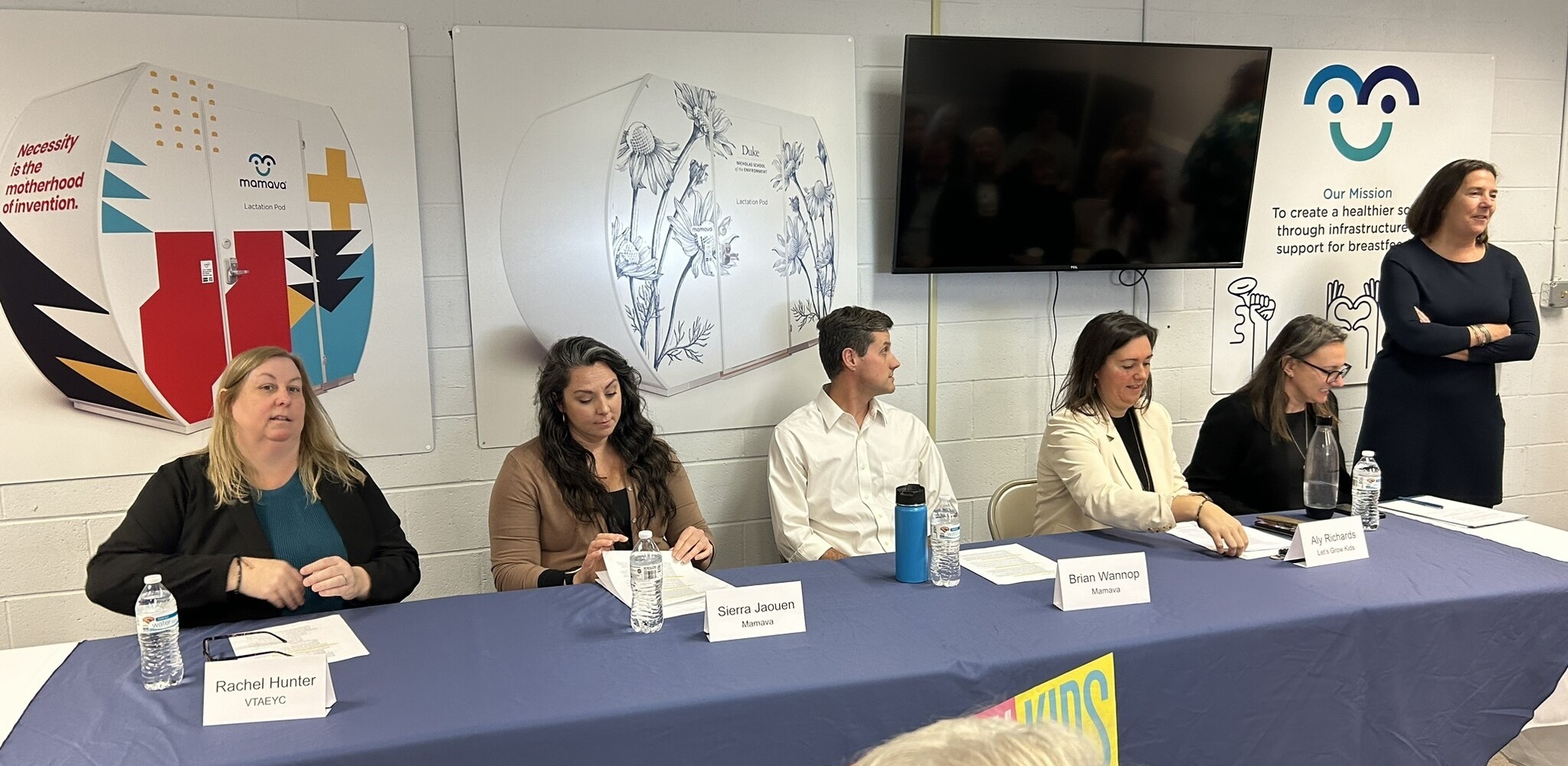Vermont Lawmakers, Business Leaders and Parents Talk Child Care at Workforce Roundtable in Springfield

Springfield, VT – This week, House Speaker Jill Krowinski joined local lawmakers, Vermont employers, parents, and early childhood educators at Mamava’s manufacturing facility in Springfield for a roundtable discussion on how public investment in child care is strengthening the state’s workforce and economy. Springfield, with its proud history as home to Vermont’s machine tool industry, has seen a resurgence in economic growth and manufacturing, and with that comes the need for quality, affordable child care made possible through the state’s groundbreaking child care law, Act 76.
The event came just weeks after Act 76 expanded eligibility for thousands of families to access the state’s child care tuition assistance program. Act 76 is investing an additional $125 million annually into Vermont’s child care system, and in its first year of implementation programs across the state have expanded capacity, upgraded classrooms, and increased compensation for staff. The new public investment has created over 1,000 new child care spaces across the state and over 259 new jobs in the field of early childhood education.
Speaker Krowinski opened the discussion before a packed room of community stakeholders and Windsor County lawmakers, including Senators Alison Clarkson and Becca White and Representative Kristi Morris: “Today’s event is a true testament to what we can achieve when we come together as Vermonters. We united across party lines to pass Act 76, demonstrating that child care is a unifying issue. It’s both an infrastructure and affordability issue, and we know we can’t tackle the challenges of school readiness and workforce shortages without improving access to quality child care in our state,” said Krowinski.
Sierra Jaouen, Office Manager at Mamava and parent of three children, shared how her family has been impacted by the child care crisis and new public investment from Act 76. When her two older children were in child care, Jaouen left the workforce due to the high cost of child care. Several years later, she was hired for her current role at Mamava, and her husband began working nights to be available for their children during the day. Her husband’s entire paycheck is used to cover part-time child care for their three-year-old son. Jaouen shared: “After learning about the recent expansion of eligibility for child care tuition assistance, I said to my husband, I think we might actually be eligible and could actually afford child care because of Act 76.”
Brian Wannop, CFO of Mamava, explained that Jaouen’s story is representative of broader trends in Vermont: “We, like most Vermont businesses, have really struggled with finding a stable workforce. There’s a disconnect in Vermont between supply and demand of workers—we don’t have enough workers, and there’s a big demand from businesses. Anything we can do to encourage more Vermonters who want to work, to be able to work, is critical. So many parents of young kids want to work but, because of the lack of child care or the cost of child care, can’t – this a huge problem. Act 76 is clearly helping,” Wannop said.
The panel then turned to the work that remains to fully solve Vermont’s child care crisis and support a stable early childhood workforce across the state. Rachel Hunter, Outreach Coordinator at the Vermont Association for the Education of Young Children, shared: “We’re making significant progress from Act 76, in terms of better compensation and support. Professionalizing the field of early childhood education will make child care an attractive field with a stable, sustainable workforce that Vermonters can train into, with a livable wage that supports families.” High turnover in the field has been a key barrier limiting many child care programs from expanding capacity to meet the demand for child care in their communities, Hunter explained.
Aly Richards, CEO of Let’s Grow Kids, the advocacy organization leading Vermont’s child care movement, closed out the panel with a pitch to employers: “With the recent eligibility expansion from Act 76 just two and a half weeks ago, hundreds of families have already signed up and been approved for child care tuition assistance – but thousands of additional Vermont children and their families are potentially eligible. Let’s get that word out through employers!”
Watch the full roundtable here..
###
About Mamava
Mamava is dedicated to transforming the culture of breastfeeding. The category creator of freestanding lactation pods, Mamava provides breastfeeding parents with private, dignified, and comfortable spaces to pump or nurse—at work and on the go. The free Mamava app helps breastfeeding parents find thousands of lactation spaces and unlock Mamava pods (available for iOS and Android). Women-founded and a proud B Corp, Mamava designs, engineers, and assembles lactation pods at their manufacturing facilities in Vermont. Founded in 2013, Mamava has delivered thousands of lactation pods to organizations that span airports, hospitals, stadiums, schools, small businesses, and Fortune 500 companies. To learn more about Mamava’s full product line and lactation support resources, visit mamava.com and follow Mamava on Instagram, Twitter, Facebook, and LinkedIn.
About Vermont's Child Care Campaign
Vermont's Child Care Campaign is led by Let’s Grow Kids, a nonprofit organization on a mission to ensure affordable access to quality child care for all Vermont families by 2025. With nearly 40,000 supporters, Let’s Grow Kids, in partnership with Let’s Grow Kids Action Network, is empowering Vermonters to advocate for sustainable child care policy change. Learn more at www.letsgrowkids.org.